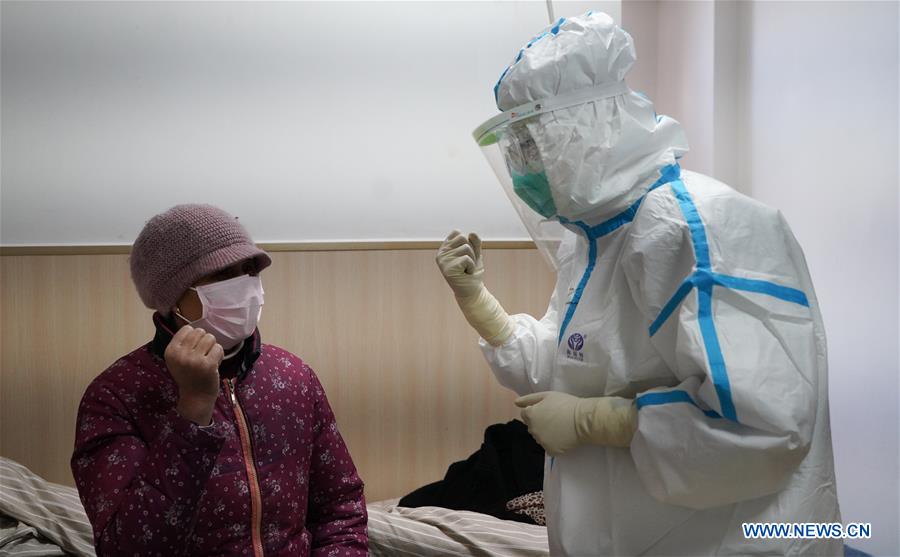China advances drug, therapy research against COVID-19
 0 Comment(s)
0 Comment(s) Print
Print E-mail Xinhua, February 22, 2020
E-mail Xinhua, February 22, 2020

China has been advancing research on drugs and therapies against the novel coronavirus disease (COVID-19), a Chinese official said on Feb. 21.
Convalescent plasma therapy has proved to be effective on severe COVID-19 cases, said Xu Nanping, vice minister of science and technology, at a press conference in Beijing.
More than 100 patients who have recovered from COVID-19 have donated plasma, and the plasma can be prepared into therapeutic products to treat more than 200 patients with severe and critical symptoms, said he.
He noted that the therapy so far proves effective on patients.
According to the official, among the first 11 patients who received the therapy in Wuhan, six have viremia which means they had the presence of the virus in their bloodstream.
Two to three days following the therapy, viremia disappeared and the patients' conditions were improved.
In northern China's Shanxi Province, patients who were once in critical condition turned stable after receiving the convalescent plasma therapy.
He added that it will be further applied to patients with severe and critical symptoms, as well as patients with rapid onset of COVID-19.
A total of 20 teams have been sent to 11 provinces to collect convalescent plasma. Local health authorities have been asked to provide support for plasma collection.
He called on recovered patients to donate plasma.
Along with convalescent plasma therapy, traditional Chinese medicine (TCM) and Chloroquine Phosphate, an antimalarial drug, have been included in the treatment guidelines.
Traditional Chinese medicine has been involved in the treatment of more than 60,000 confirmed COVID-19 cases, accounting for more than 85 percent of the total, Xu told reporters.
In general, traditional Chinese medicine has shown a certain curative effect, and the combination of traditional Chinese and Western medicine treatment has proved to be effective much more obviously, he said.
Chloroquine Phosphate, which has been used for more than 70 years, has been tested in 135 cases in Beijing and southern China's Guangdong Province. Among them, 130 patients have light and common symptoms, and five are severe patients.
None of the patients with light and common symptoms have developed severe symptoms. Four severe patients have been discharged from hospital, and one has seen severe symptoms mitigated to normal, Xu said.
"The drug has been enrolled in the sixth version of the treatment guidelines, and we hope to further sum up its effect on the basis of wider clinical application," he said.
Meanwhile, two drugs, Favipiravir and Remdesivir, and stem cell therapy are currently under clinical trials, Xu told reporters.
Favipiravir, an influenza drug available on overseas markets, has been put in a parallel controlled study in Shenzhen, Guangdong, with 80 patients enlisted, Xu said.
According to earlier reports, the initial outcome of the trial shows the drug has relatively obvious efficacy and low adverse reactions. Three to four days after treatment, the group taking the drug had a significantly higher turning-negative rate in the viral nucleic acid than the parallel control group.
"Experts have suggested expanding the trial to further observe and study its effect," he said.
Remdesivir, developed against Ebola infections by American pharmaceutical company Gilead Sciences, has shown fairly good antiviral activity against the novel coronavirus at the cellular level.
The China-Japan Friendship Hospital and the Institute of Materia Medica under the Chinese Academy of Medical Sciences have been authorized to conduct a clinical trial on the drug in over 10 hospitals in Wuhan, the center of the epidemic in central China's Hubei Province.
So far, more than 200 patients with severe and critical symptoms and over 30 patients with mild and common symptoms have been enrolled in the trial, Xu said.
The trial, which started on Feb. 6 and will last until the end of April, adopts a strict randomized double-blind controlled design, which means both patients and doctors do not know who has taken the trial drug. The result will only be revealed after the trial is completed.
"If it has a good effect, we will work with Gilead Sciences to develop a proper drug supply method," Xu said.
Clinical studies on stem cell therapy, which can inhibit the overreaction of the body's immune system, have also been carried out to treat severe patients.
Four patients who have received the therapy have been discharged from hospital, and the trial will be further expanded, he said.
Also at the press conference on Friday, an official with the National Health Commission (NHC) said the COVID-19 epidemic has shown a positive trend on the Chinese mainland, indicating that the outbreak is under control.
Figures including new confirmed cases across the country, new confirmed cases outside Hubei Province, and new confirmed cases in Wuhan, epicenter of the outbreak, as well as in other places of Hubei, have all been dropping gradually, said Zeng Yixin, deputy director of the NHC.






Go to Forum >>0 Comment(s)